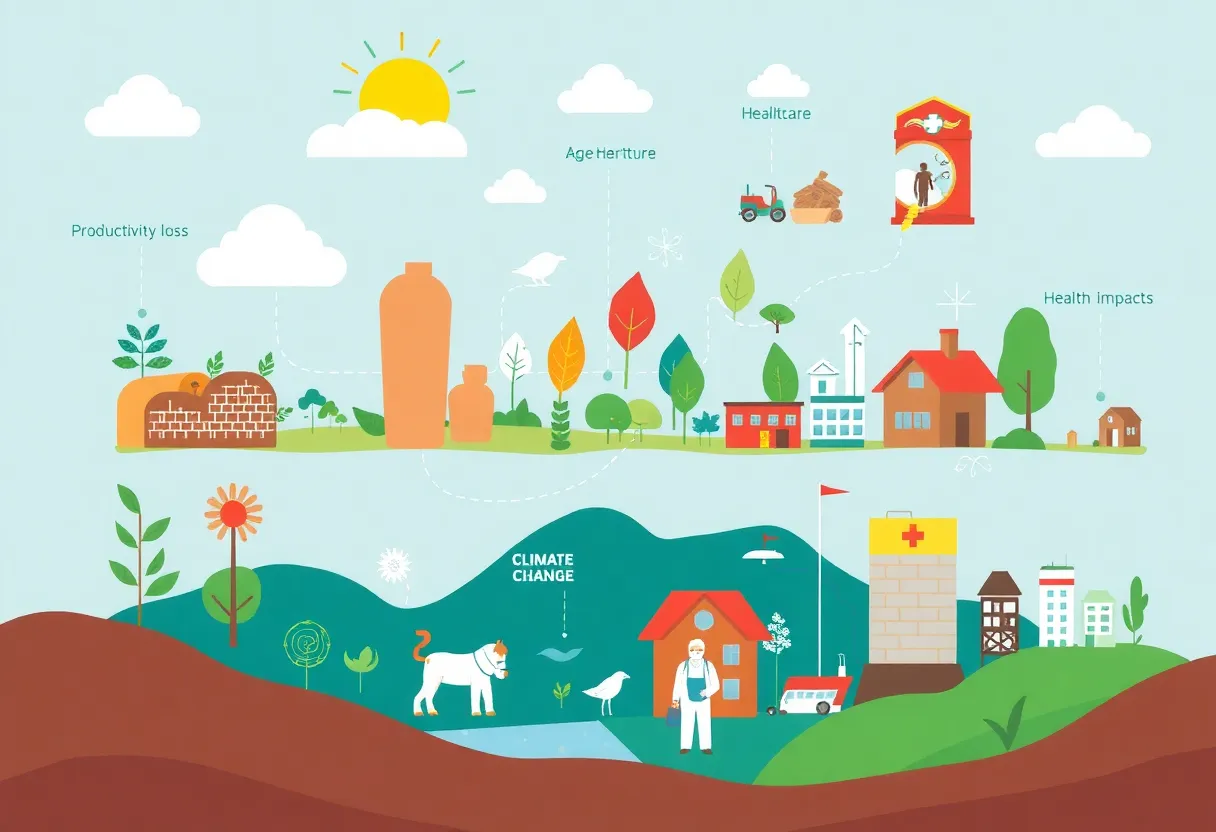Belém, September 18, 2025
News Summary
A new report by the World Economic Forum and Boston Consulting Group warns that climate-driven health impacts could cause over $1.5 trillion in lost output over the next 25 years. The findings indicate significant productivity losses across sectors including food and agriculture, built environment, and health care, while also emphasizing the need for proactive adaptation strategies to mitigate future economic burdens.
Belém
New global report warns that climate-driven health impacts could cost the global economy more than $1.5 trillion in lost output over the next 25 years. The report, prepared by the World Economic Forum with Boston Consulting Group (BCG), finds that workforce illness linked to climate change will cut productivity across multiple sectors and that the estimate covers only a subset of affected industries, suggesting the full economic toll could be larger.
Most important findings
The report estimates that climate-driven health impacts may lead to over $1.5 trillion in lost output from certain health-related illnesses over the next 25 years. This figure only includes losses in three sectors—food and agriculture, the built environment, and health and health care—meaning additional sectors could face further productivity losses not captured in the total.
The report is titled “Building Economic Resilience to the Health Impacts of Climate Change.” It models the economic cost of lost productivity arising from seven major health risks exacerbated by climate change and covers the period between 2025 and 2050.
Sector-level impacts and breakdown
- Food and agriculture: Losses due to climate-health impacts could total $740 billion, with significant implications for global food security.
- Built environment: Projected productivity losses total $570 billion as rising heat, infrastructure stress, and disease affect workers and operations.
- Health and health care: The sector could lose $200 billion in productivity from climate-related workforce illness, while increased disease rates may heighten demand pressures on services.
Why the costs could be higher
The $1.5 trillion estimate only accounts for losses in the food and agriculture, built environment, health and health care sectors, suggesting that the total economic burden could be greater. The analysis relies on health data drawn from scientific literature and economic cost data from the International Labour Organization and World Bank; gaps in data and effects on other industries mean the real cost could extend beyond the modeled estimate.
Business risks and adaptation priorities
The study highlights that climate change is accelerating health risks such as extreme heat and infectious diseases, making adaptation a crucial business priority. Companies are advised to protect worker health and build operational resilience to avoid higher adaptation costs later. Delays in integrating health-focused resilience strategies into business practices will increase risks to human health and productivity and raise future adaptation costs.
Investing early in adaptation could also create commercial opportunities. Examples of potential innovation include climate-resilient crops, heat-stable medications, cooling technologies for workers, and novel insurance models for climate-health protections. The insurance industry is expected to see a significant rise in climate-health claims, presenting both cost pressures and opportunities for new products.
Data, policy and finance needs
The report calls for coordinated global efforts to build health resilience. That requires supportive policies, improved climate-health data systems, and innovative financing solutions to support employers, health systems, and communities in adapting to evolving risks.
Timing and context
The findings of the report were released in anticipation of the World Economic Forum’s Sustainable Development Impact Meetings and the upcoming COP30 climate conference in Belém, Brazil. These meetings, taking place from September 22 to 26, 2025, will focus on sustainable development and health adaptation strategies.
By quantifying sectoral productivity losses and naming adaptation pathways, the report frames both the risks to business continuity and the possible economic opportunities from early action on climate-related health threats.
FAQ
What is the estimated economic cost from climate-driven health impacts?
A report from the World Economic Forum, created with Boston Consulting Group (BCG), estimates that climate-driven health impacts may lead to over $1.5 trillion in lost output from certain health-related illnesses over the next 25 years.
Does the $1.5 trillion figure cover all sectors?
This $1.5 trillion estimate only accounts for losses in the food and agriculture, built environment, health and health care sectors, suggesting that the total economic burden could be greater.
What are the sector-specific loss estimates?
In the food and agriculture sector, losses due to climate-health impacts could total $740 billion, with significant implications for global food security.
The built environment sector is projected to face $570 billion in productivity losses due to climate-health issues.
The health and health care sector could lose $200 billion in productivity from climate-related workforce illness, and increased disease rates may heighten demand pressures.
What is the title of the report?
The report is titled “Building Economic Resilience to the Health Impacts of Climate Change.”
When and where were the findings released in relation to major events?
The findings of the report were released in anticipation of the World Economic Forum’s Sustainable Development Impact Meetings and the upcoming COP30 climate conference in Belém, Brazil.
When will related meetings take place?
These meetings, taking place from September 22 to 26, 2025, will focus on sustainable development and health adaptation strategies.
What timeframe does the report cover and what data does it use?
The report identifies seven major health risks exacerbated by climate change and models the economic costs associated with lost productivity due to these risks between 2025 and 2050.
The report is based on health data from scientific literature and economic cost data from the International Labour Organization and World Bank.
Quick reference table: Sector productivity loss estimates (2025–2050)
| Sector | Estimated Productivity Loss | Notes |
|---|---|---|
| Food and agriculture | $740 billion | Implications for global food security |
| Built environment | $570 billion | Heat, infrastructure stress and worker impacts |
| Health and health care | $200 billion | Workforce illness and increased service demand |
| Total (modeled sectors) | $1.5 trillion | Only covers the three sectors listed above |
Deeper Dive: News & Info About This Topic
HERE Resources
Boston’s September 1 Moving Day Causes Urban Congestion
Federal Halt on Revolution Wind Project Causes Stir in Rhode Island
Boston Unveils Comprehensive 2030 Climate Action Plan
UMass Boston Launches Living Seawall Project to Enhance Marine Habitat
UMass Boston Forms Partnership with Derry for Educational Advancement
Boston Faces Rising Sea Level Threats by 2050
Procter & Gamble to Cut 7,000 Jobs in Major Restructuring
Boston Cyclists Demand Safe Bike Lane Reassessment
Declining International Student Enrollment Threatens Massachusetts Economy
Massachusetts Leaders Warn of Federal Funding Cuts Impact
Additional Resources
- Morningstar: Climate-driven health risks to put $1.5 trillion in productivity at stake by 2050
- New York Times: Trump NIH cuts and climate change health impacts
- New York Times: Extreme heat, pollution and health
- New York Times: Trump and climate satellites
- New York Times: Climate change regulation and health
- Wikipedia: Climate Change and Health
- Google Search: Climate Change Health Risk
- Google Scholar: Climate Change Health Impacts
- Encyclopedia Britannica: Climate Change and Health
- Google News: Climate Change Health Report

Author: STAFF HERE BOSTON WRITER
The BOSTON STAFF WRITER represents the experienced team at HEREBoston.com, your go-to source for actionable local news and information in Boston, Suffolk County, and beyond. Specializing in "news you can use," we cover essential topics like product reviews for personal and business needs, local business directories, politics, real estate trends, neighborhood insights, and state news affecting the area—with deep expertise drawn from years of dedicated reporting and strong community input, including local press releases and business updates. We deliver top reporting on high-value events such as Boston Marathon, Head of the Charles Regatta, and Boston Harborfest. Our coverage extends to key organizations like the Greater Boston Chamber of Commerce and Associated Industries of Massachusetts, plus leading businesses in finance, biotech, and insurance that power the local economy such as Fidelity Investments, Biogen, and Liberty Mutual Insurance. As part of the broader HERE network, we provide comprehensive, credible insights into Massachusetts's dynamic landscape.





